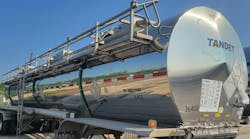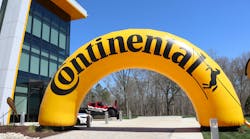Since 1994 when it was founded, Bulk Carrier Services Inc (BCS) experienced some lean years as a result of downturns in the tank truck industry, but because the Las Vegas, Nevada, company provided transportation and a broker service, the carrier was able to thrive.
“Diversification paid off in the down economy,” says Maxine Miller, BCS president. “Today, our business is about 60% brokerage and 40% trucking, and that seems to work well for our operation.”
Miller started the business as a broker and only later saw the benefit of having a tank truck fleet that, combined with the broker division, adds up to about $10 million in annual revenue. The fleet numbers 35 tank trailers, 10 company-owned power units, and 13 owner-operator tractors that are used to haul chemicals across the United States. Among the products transported are hazardous materials waste, caustics, corrosives, and acids.
The broker side of the business complements the trucking side because Miller is able to serve customers with her own fleet as well as providing services from other carriers. Her company has relationships with as many as 50 carriers and about the same number of chemical companies. The broker side of the business also keeps BCS's owner-operators and company units on the road when the carrier doesn't have loads of its own available.
“Our goals are to provide a high level of service for all our customers,” she says. “One way we do that is by maintaining an excellent safety record with our experienced drivers. In addition, we can transport and/or broker a wide variety of commodities, including liquid and dry chemical products. Our company also can provide flat bed, refrigerated, dry box, and heavy haul services. With all of that, we are licensed to transport products in all the US states and in most of the Canadian provinces.”
When the business first expanded to include tank trailers, it operated with only two used tank trailers that hauled a few chemicals. Before long, more trailers were added and the company was soon busy transporting various types of chemicals, including bleach, liquid polymer, caustics, and acid.
Fred Bennett, vice-president and a part-owner of the business, originally joined the company as an owner-operator, moving to Nevada from Rochester, New York. Today, he is the marketing director. Miller's son, David Warrilow, oversees dispatch and maintenance while her daughter, Dawn Sanders, is involved in administration.
The family-style operation works well for a carrier that emphasizes its personal touch with customers, says Miller. It also seems to work well in an environment that ranges from scheduled services to responding to just-in-time demands.
“We get a lot of load requests via e-mail,” says Miller. “Sometimes we have a week to work with scheduling. Sometimes we are responding within hours.”
Tractor specification
While customer service is paramount in the BCS culture, keeping drivers satisfied shares equal status, Miller says. “Our tractor fleet includes vehicles with plenty of power to ease driver handling,” she points out.
BCS also selected Kenworth T800 tractors for maneuverability that is enhanced by set-back front axles. Specifying sun roofs and digital satellite radios with numerous channels also keeps drivers happy. “We think of the tractors as the drivers' homes,” says Miller.
The power units, supplied by Kenworth Sales Co in Las Vegas, consist mostly of 2006 and 2007 models with 72-inch AeroCab VIT flat top sleepers. Jeff Jorgensen of the Las Vegas dealership pointed out that BCS trucks are “nicely dressed with lots of stainless steel and polish and are equipped to handle a wide range of conditions. They are specified with 31-cubic-feet-per minute air compressors that make them capable of self unloading the trailers. We fine-tune the gearing, wheelbase, fifthwheel height, and other option choices to keep the tractor weight to a minimum while also maintaining performance and resale value.”
Powered by Caterpillar C-15 Acert multi-torque engines rated at 475 horsepower, the tractors have Fuller 18-speed transmissions with 1,850 foot-pounds of torque. Running gear includes Roadranger steering and drive axles, Kenworth air ride suspension, Bendix antilock braking with traction control, and Alcoa aluminum wheels. BCS specifies Bridgestone tires.
Maintenance program
The carrier chose the Kenworth PremierCare Preventive Maintenance program that offers maintenance schedule choices and service levels, ranging from intermittent “dry inspections” to comprehensive, bumper-to-tail-light service packages. The program includes factory-recommended procedures and annual safety inspections. BCS tractors can be serviced on the road as well as when they are at home. The driver contacts the Kenworth program representatives, who in turn contact the nearest participating Kenworth dealer for an appointment.
The carrier also uses the Kenworth PremierCare Roadside Service program that includes a toll-free number to reach a service representative. Supported by mapping and communications technology, the customer representative contacts the nearest participating Kenworth dealer or designated Kenworth PremierCare provider to dispatch assistance or makes arrangements to get the truck into the shop immediately, if necessary.
The BCS fleet includes Polar and Brenner tank trailers, some rubber lined. The newest DOT407 tankers are specified with 7,000-gallon capacity and a 12-inch-drop double-conical design.
Components include Girard pressure-relief and vapor recovery vents and Betts CH47003-SST four-inch internal valves with secondary Betts three-inch Hydrolet valves. “We feel this is the safest and most sanitary valve combination available,” says Bennett.
Running gear includes Hendrickson air ride suspensions, MeritorWabco antilock brake system, and Alcoa aluminum wheels. Truck-Lite supplies lighting.
The trailers are plumbed with pressurization lines so that the driver can fully unload without climbing to the top of the tank. A fall protection cable is provided at the spill dam. “These specifications will be our future model for all our stainless steel tankers,” notes Bennett.
BCS has one Tankcon fiberglass reinforced plastic (FRP) tank trailer in the fleet. The DOT412 trailer has a 5,400-gallon tank with an air-driven top-mounted emergency valve. The unit is fully plumbed with air pressurization lines to the tank trailer and to the outlet manifolds to assist the driver in multiple stop deliveries. Currently the FRP tank trailer is in dedicated bleach service.
Miller and her managers say they believe the FRP tank trailer is the future for specialty tankers for the acid and bleach industry. “The ability to properly clean in order to switch products is essential to our business,” she says. “The FRP style tanker will be BCS's choice in the future for acid and bleach service.”
BCS has two Polar rubberlined tank trailers in the fleet. They are 5,000-gallon chlorobutyl-lined tanks with air actuated bottom-mounted emergency valves. These tank trailers are dedicated to hydrochloric acid and bleach service.
Tank trailer repair
Tank trailer maintenance and repair is out-sourced to various repair facilities where the vehicles are based in Arizona, California, Nevada, and Utah. Although Las Vegas is the central location for the company, vehicles in other sectors operate from leased parking areas such as tank wash racks.
To coordinate the operation, dispatch stays in touch with drivers via MotoroRazr cell phones from Motorola. The carrier has special long-range antennas installed on the trucks for added ease of communication. Other fleet management aids include a ProMiles software program for calculating mileage, a driver log management program from J J Keller, and QuickBooks accounting software.
BCS designed a bill of lading that indicates a shipment has been properly loaded and seals and placards attached. A signature from the shipper verifies the information. “This has really paid off for us,” says Miller. “We know that when we leave the loading rack, the load is secure and the appropriate placards are in place.”
Another security element calls for specifying password-protected codes to start the truck engines. “We just had concerns about security and protecting the products we haul,” says Miller. “With this system, only the drivers and the dispatchers know the codes.”
Driver training
Many shippers require driver training on site as well as identification badges. BCS training includes company policies, Department of Transportation regulations, defensive driving, and hazardous materials handling. Emphasis is placed on the use of personal protective equipment, including full-face respirators. Bennett, Warrilow, and Tina Mettke, safety and dispatch department, are all qualified training instructors.
Driver applicants must have two years of tank experience and hold a hazardous materials endorsement on their commercial driver license in order to be considered for a position.
The current driver hours-of-service rules have complicated the company's operations, because waiting and loading some products may require up to 12 hours, she says. Driving time also is used up with drivers testing product, handling material safety data sheet information, time spent for tank cleaning, and delays in traffic. “Tank cleaning is required after just about every load,” Miller says.
Despite the challenges, the future looks bright for BCS. Miller says plans call for enlarging the fleet in order to keep up with customer demand.
“We expect to buy more tank trailers in 2008,” she says. “As for now, I think we need to stay pretty much the same size company as we are now. I don't want to grow too fast.”










